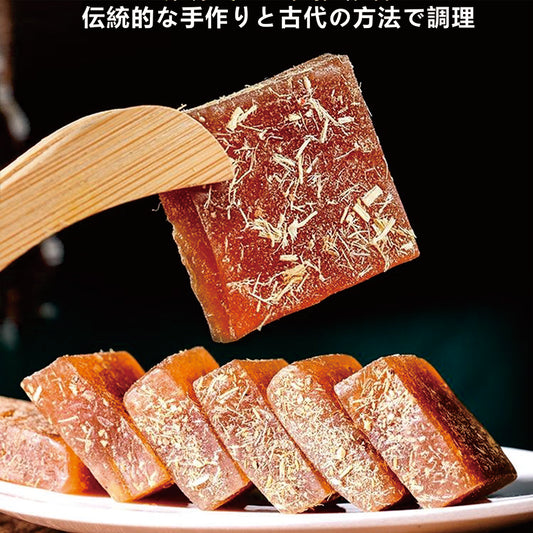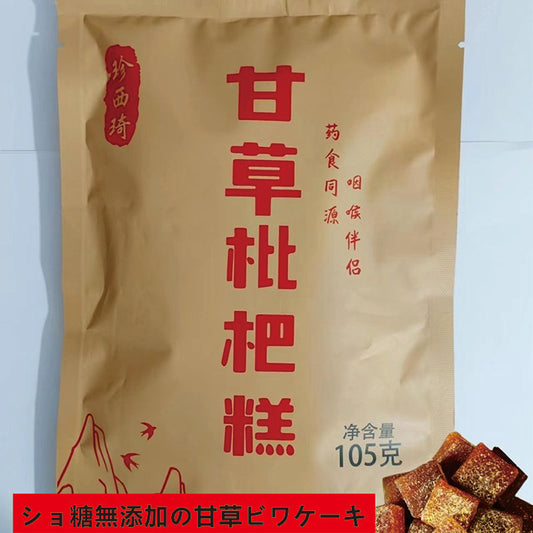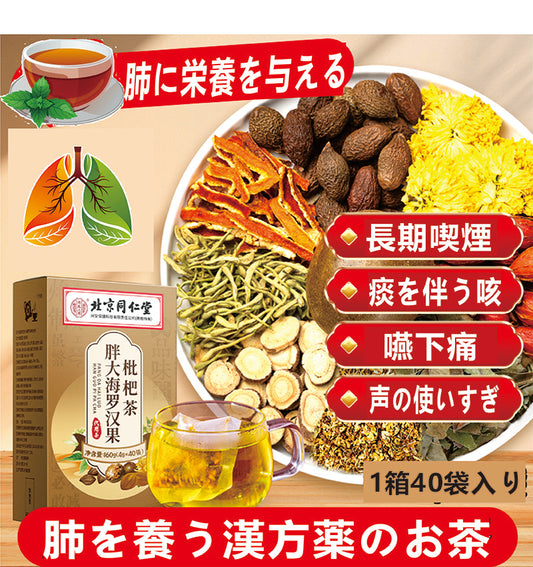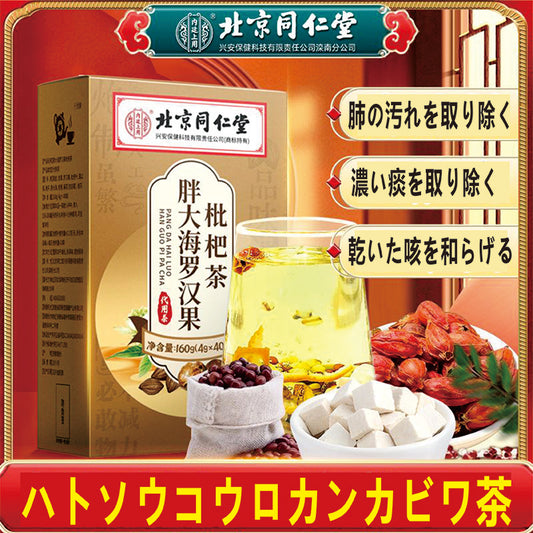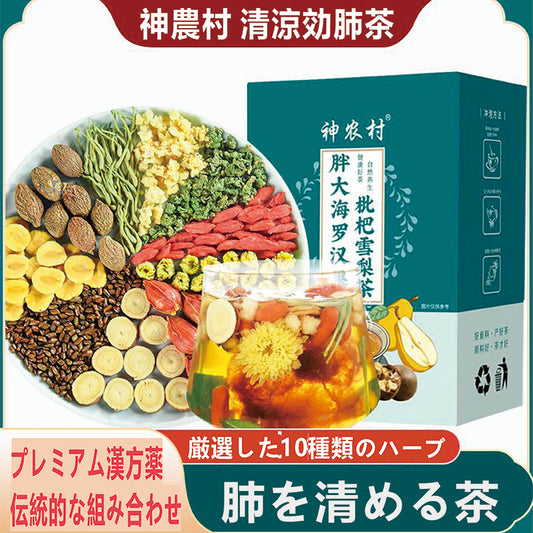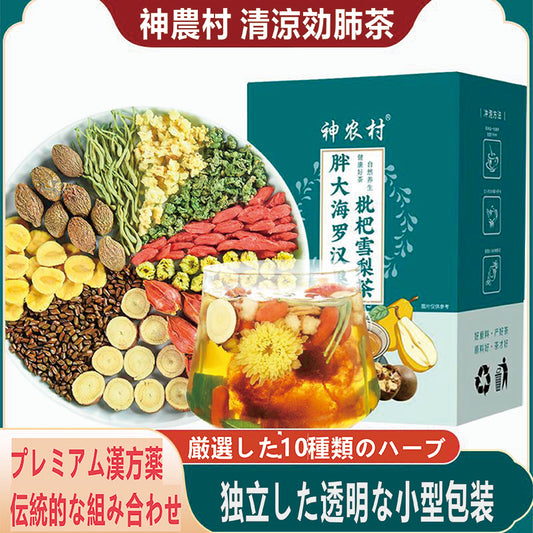-
Licorice and loquat fruit cake (5 bags total 525g)
Regular price ¥9,450 JPYRegular priceUnit price / per -
Tremella lohan fruit loquat tea
Regular price From ¥7,800 JPYRegular priceUnit price / per -
tea to cleanse the lungs
Regular price From ¥7,872 JPYRegular priceUnit price / per
Collection: lung health series

Maintaining the health of internal organs in traditional Chinese medicine - Lung chapter
The lungs are the highest of the organs, control the external skin, and communicate with the nostrils, so they have a very close relationship with the outside world. They are very sensitive to changes in climate and environment, and although their lungs are soft and of good quality, they cannot tolerate extreme cold or heat. Therefore, it is said that when exposed to the six evil spirits, cold and heat, the lungs are the first to become ill. For this reason, the lungs are also called the ``chests''. Lungs play an important role in the human body. According to ``Submon: Rokuseki Zozoron'', it is ``lung person, ki no book''. The lungs contain Qi, control breathing, and direct Qi throughout the body. The lungs also have the function of channeling water, regulating the flow of Qi and water metabolism in the body. Just like the prime minister of a country, in Chinese medicine, the lungs are valued and cherished as the "conferring official." When your lungs are full of qi, you will experience fewer illnesses and live a longer and healthier life.
1. How to maintain Qi in the lungs The lungs are the basis of Qi and utilize Qi. The normal state of Qi in the lungs affects not only the function of the lungs themselves, but also the health of the body. Therefore, preserving the Qi in the lungs is a health method in Chinese medicine. Maintaining the qi in the lungs means enriching the qi in the lungs, making it clean and light, allowing it to move smoothly, protecting against external evils, and playing a role in regulating the flow of qi and the path of water. There are three main methods:
1. Avoid external evils The qi in the lungs has the function of preventing external evils, and when external evils enter the human body, they first enter the lungs and damage the qi in the lungs. Therefore, in order to maintain Qi in the lungs, we must first avoid external evils. In the winter and spring seasons, avoid cold and cold, be careful about cold weather, and wear clothing of appropriate thickness according to changes in temperature. In spring and summer, avoid the heat, pay attention to the hygiene of your living environment and food, and always take heat-reducing foods and medicines. In autumn, avoid dryness, drink plenty of water, and take nourishing foods and medicines.
2. Refrain from speaking In Chinese medicine, a person's vocalizations and speaking are closely related to the qi of the lungs, and the ``Difficult Ching/Forty Tribulations'' states that it is the ``main voice of the lungs.'' The loudness and strength of your voice depend on the support of qi in your lungs, and simply put, it takes qi to say a word. Speaking a lot can easily exhaust the Qi in your lungs, causing Qi deficiency in your lungs and causing many diseases. Therefore, Sun Simian advises people who maintain good health to "value Qi and not talk too much," and at least "talk a little" can replenish the Qi in the lungs and prevent unnecessary exhaustion.
3. Don't worry Worry is the will of the lungs. Anxiety refers to grief and sadness, and according to the book ``Subun: Yin-Yang Ōsho Dairon,'' the lungs are ``shimei-wai, sorrowful lungs.'' Sadness disrupts the normal heart and lung qi, prevents upper jiao from passing through, obstructs the flow of qi and blood in the body, causes the whole body to lose strength, makes it difficult to even stand, makes it difficult to breathe, and makes the nose runny naturally. There is even. Therefore, in Chinese medicine, it is believed that ``when you are sad, you become exhausted.'' Therefore, in order to preserve Qi in the lungs, it is important to avoid sad emotions and maintain a cheerful mood.
2. Daily preparation method Lung health depends on careful preparation in daily life. Based on the physiological characteristics of the lungs, it is necessary to adopt good lifestyle habits and avoid harmful stimuli.
1. Focus on exercise The lungs are the ``masters of Qi'' in the human body, and when Qi is active, we are healthy, but when Qi is stagnant, we become ill. Therefore, to keep your lungs healthy, you should focus on exercise. However, you need to be careful not to make exercise too tiring. Huada warns, ``We want to make the human body work, but we must not make it work to extremes.'' You should choose aerobic exercise (Tai Chi, Five Birds, etc.) that is moderate in duration, moderate in intensity, and rhythmic. It is also important to practice deep breathing and increase your lung capacity.
2. Avoid raw and cold foods The lungs are sensitive to cold, and consuming cold food and drinks can inhibit the movement of qi in the lungs, which can lead to chronic lung diseases (such as cold and cold lungs). .
3. Pay attention to the cleanliness of the air. The lungs are said to be ``clean and empty, free of waste,'' and the quality of the air outside has a big impact on the health of the lungs. Therefore, it is important to regularly ventilate the house and keep the indoor air clean and dry. This ensures lung health and normal exercise of respiratory metabolism. If you have time, you can go outdoors or to the forest to enjoy fresher air. Also, care should be taken to avoid contact with dirty or harmful air. Don't forget to wear a mask on foggy days. People who have a smoking habit should gradually decide to quit smoking. This is very important for lung protection.
3. How to eat and drink 1. Eat a lot of spicy food The five elements of the lungs are metal, and it belongs to the spiciness category. According to Chinese medicine, it is called ``Shin Ren Lung.'' ``Ryokan Gomi'' has the meaning of ``grain-flavored, spicy, leading lung''. Therefore, to take care of your lungs, it is important to consume a moderate amount of pungent foods and medicines. These help dissipate wind chill and spread lung qi. In addition, in the ``Submon and Zokiho Shiron'', it is written that ``Lungs are bitter, and fast eating is painful,'' and ``Lungs are pale, and eating is difficult. Wheat, mutton, apricots, and yam are all bitter.'' Bitter taste has been shown to eliminate qi frenzy in the lungs and should be added to daily lung regimens and medicines accordingly.
2. Avoid cold foods The lungs are sensitive to cold, so ingesting cold foods and drinks can inhibit the movement of Qi in the lungs, which can lead to chronic lung diseases (such as cold and cold lungs). there is.
3. Replenish Qi and Yin The lungs mainly contain Qi, and if the Qi in the lungs is insufficient, symptoms such as difficulty in breathing and weakened immune system will appear. Therefore, to supplement lung qi, you can choose astragalus, clam worm, ginseng, etc., and you can choose preparations such as 汤, jade folding dust, etc. to supplement lung qi. The lungs are yin organs, and a lack of yin fluid causes symptoms such as fever, dry cough, dry mouth, and hoarseness. It is especially susceptible to modern environmental pollution. Therefore, it is necessary to take appropriate foods and medicines that replenish moisture in the lungs. Chemicals such as barley, lily, rhizome, mulberry leaves, sesame, and honey are suitable, as well as preparations such as yurigokanamaru, nifuyuto, junryoto, and seisheiryoto. Also, by boiling chrysanthemum and pork liver together and drinking it, you can moisten the yin and purify the fire.
If you have lung fever, asthma, and phlegm, you can use pear stew with river shellfish. Peel and cut the washed pears, remove the core, put a few river shellfish and ice sugar inside the pears, steam the water for about an hour, then take out the pears and eat. This method moistens the lungs and clarifies phlegm.

